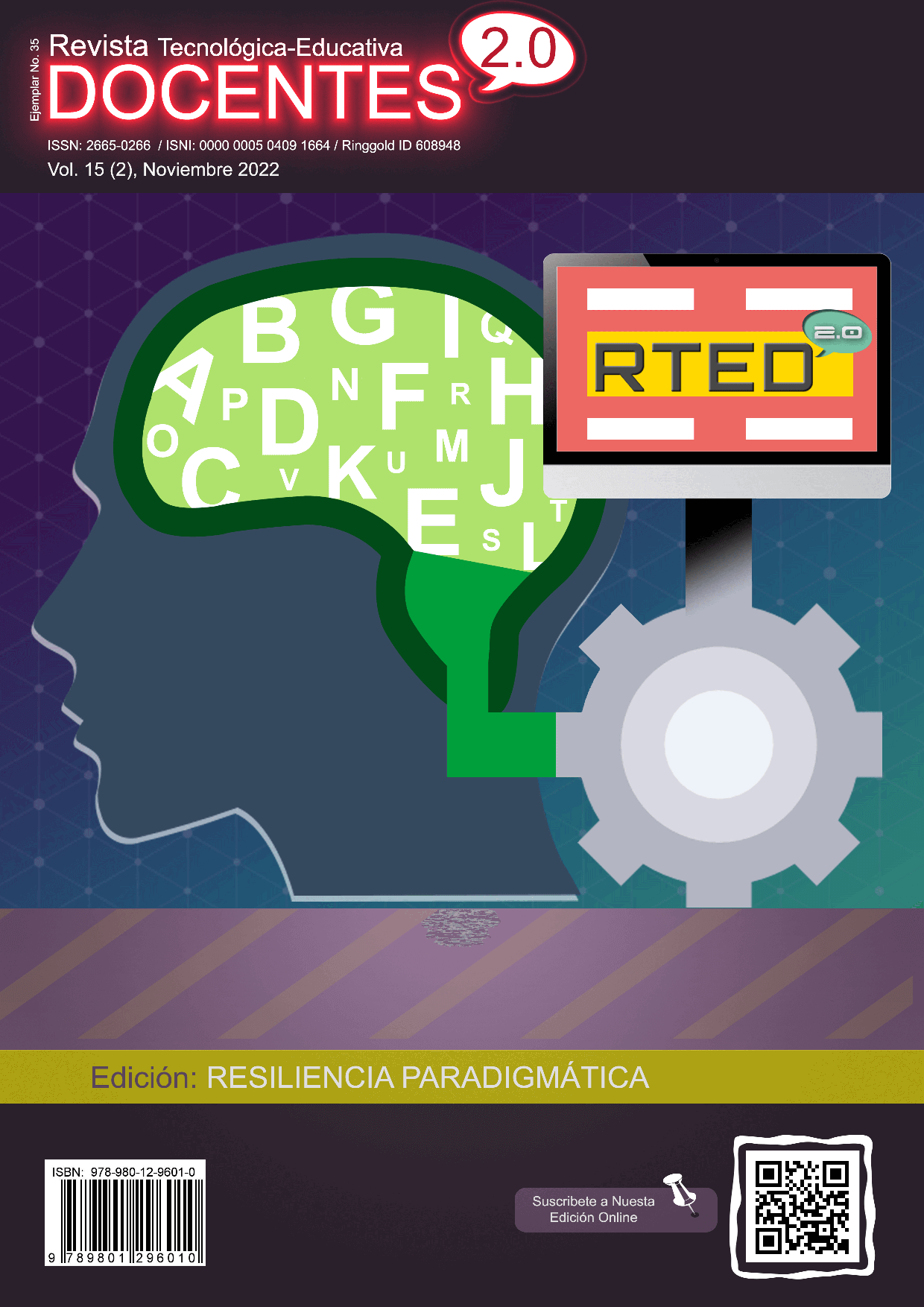Microcurricular Planning as an Effective Tool in the Learning Achievements of Children in Initial Education
 DOI:
https://doi.org/10.37843/rted.v15i2.311
DOI:
https://doi.org/10.37843/rted.v15i2.311
Main Article Content
Abstract
Microcurricular planning is an essential tool that strengthens the work methodology applied by teachers in educational institutions of initial education; therefore, it is necessary that this planning be flexible and meet the five moments: diagnosis, purpose, selection of strategies, tools, and assessment, as stipulated in the national curriculum. The objective of this article was to determine if the micro-curricular planning developed by teachers contributes to learning achievements at the initial education level. The positivist paradigm used the deductive method with a quantitative approach, descriptive-exploratory type, and non-experimental design. It was developed with a non-probabilistic convenience sample of 17 initial education teachers in an educational institution in the canton of Santa Elena, province of Santa Elena-Ecuador. For data collection, a survey was designed with its respective Likert scale and applied to the study subjects to evaluate the effectiveness of micro-curricular planning. The instrument's reliability was obtained with the statistical program SPSS through the Cronbach coefficient that reflected a value of 0.969. As a result, it was detected that teachers know the phases of micro-curricular planning; however, they show difficulties when carrying out these phases in practice. It is concluded that when this tool is always applied appropriately, it benefits the learning acquisition of children at the initial level.
Downloads
Metrics
Article Details

This work is licensed under a Creative Commons Attribution-NonCommercial-NoDerivatives 4.0 International License.
Those authors who have publications in our journal accept the following terms:
- When a work is accepted for publication, the author retains rights of reproduction, distribution of his/her article for exploitation in all countries of the world in the format provided by our magazine and any other magnetic medium, optical, and digital.
- Authors will retain their copyright and guarantee the journal the right first to publish their work, which will be simultaneously subject to the Creative Commons Acknowledgment License (Attribution-NonCommercial-NoDerivatives 4.0 International (CC BY-NC-ND 4.0)). That allows third parties to copy and redistribute the material in any medium or format, under the following conditions: Acknowledgment - You must properly acknowledge authorship, provide a link to the license, and indicate if any changes have been made. You may do so in any reasonable way, but not in a way that suggests you have the licensor's endorsement or receive it for your use. NonCommercial - You may not use the material for a commercial purpose. NoDerivatives - If you remix, transform, or build from the material, you cannot broadcast the modified material. There are no additional restrictions - You cannot apply legal terms or technological measures that legally restrict you from doing what the license allows.
- Authors may adopt other non-exclusive license agreements to distribute the published version of the work (e.g., deposit it in an institutional archive or publish it in a monographic volume) provided that the initial publication in this journal is indicated.
- Authors are allowed and recommended to disseminate their work through the Internet (e.g., in institutional telematic archives, repositories, libraries, or their website), producing exciting exchanges and increasing the published work's citations.
- Request of withdrawal an article has to be done in writing by the author to the Editor, becoming effective after a written response from the Editor. For this purpose, the author or authors will send correspondence via e-mail: [email protected].
- The author will not receive financial compensation for the publication of his work.
- All Docentes 2.0 Journal publications are under the Open Journal System (OJS) platform at: https://ojs.docentes20.com/.
References
Aguilar-Gordón, F. D. (2020). Del aprendizaje en escenarios presenciales al aprendizaje virtual en tiempos de pandemia. Estudios pedagógicos (Valdivia), 213-220. http://dx.doi.org/10.4067/S0718-07052020000300213 DOI: https://doi.org/10.4067/S0718-07052020000300213
Ajila, Y. (2016). Planificación microcurricular, con metodología pertinente y rítmica corporal en el desarrollo de las nociones espaciales en los niños [Tesis de grado]. UTMACH. http://repositorio.utmachala.edu.ec/bitstream/48000/8873/1/ECUACS%20DE00004.pdf
Armando-Picon, G., González de Caballero, G. K., & Paredes-Sánchez, J. N. (2021). Desempeño y formación docente en competencias digitales en clases no presenciales durante la pandemia COVID-19. Arandu UTIC, 139-153. http://www.utic.edu.py/revista.ojs/index.php/revistas/article/view/129 DOI: https://doi.org/10.1590/SciELOPreprints.778
Bolaños, G., & Molina, Z. (1990). Introducción al currículo. EUNED. https://books.google.com.gt/books?id=Ew_JkA-5EaUC&printsec=frontcover#v=onepage&q&f=false
Dzul-Escamilla, M. (2010). Aplicación básica de los métodos científicos. https://www.uaeh.edu.mx/docencia/VI_Presentaciones/licenciatura_en_mercadotecnia/fundamentos_de_metodologia_investigacion/PRES38.pdf
Hernández-Ávila, C. E., & Carpio-Escobar, N. A. (2019). Introducción a los tipos de muestreo. Alerta, Revista científica Del Instituto Nacional De Salud, 2(1), 75–79. https://doi.org/10.5377/alerta.v2i1.7535 DOI: https://doi.org/10.5377/alerta.v2i1.7535
Hernández-Sampieri, R., Fernández-Collado, C., & Baptista-Lucio, P. (2014). Metodología de la investigación (6a. ed.). México D.F.: McGraw-Hill.
Hurtado, F. (2020). Planificación y evaluación curricular: Elementos fundamentales en el proceso educativo. Revista de Investigación en Ciencias Sociales, 5(2), 18. https://revistas.uclave.org/index.php/dissertare/article/view/2928/1826%0Ahttps://revistas
López-Salmorán, L. (2011). El concepto de logro educativo en sentido amplio. https://es.scribd.com/document/168361361/Elconceptodelogroeducativoensentidoamplio
Ministerio de Educación. (2014). Currículo Educación Inicial 2014. Ministerio de Educación. http://8.242.217.84:8080/jspui/handle/123456789/33456
Otzen, T., & Manterola, C. (2017). Técnicas de Muestreo sobre una Población a Estudio. Int. J. Morphol, 227-232. https://scielo.conicyt.cl/pdf/ijmorphol/v35n1/art37.pdf DOI: https://doi.org/10.4067/S0717-95022017000100037
Pozo, M., Suárez, M., & García, M. (2012). Logros educativos y diversidad en la escuela: hacia una definición desde el consenso. Revista de Educación. http://dx.doi.org/10-4438/1988-592X-RE-2012-358-183
Quero-Virla, M. (2010). Confiabilidad y coeficiente Alpha de Cronbach. Telos, 248-252. https://www.redalyc.org/pdf/993/99315569010.pdf
Rodríguez, A. (2021). Planificación curricular y desempeño docente de una Unidad Educativa de Santa Elena, Ecuador 2021 [Tesis de posgrado]. Universidad César Vallejo. https://repositorio.ucv.edu.pe/bitstream/handle/20.500.12692/64956/Rodriguez_MAA-SD.pdf?sequence=1&isAllowed=y
Rojas-Cairampoma, M. (2015). Tipos de Investigación científica: Una simplificación de la complicada incoherente nomenclatura y clasificación. Revista Electrónica de Veterinaria, 16(1),1-14. https://www.redalyc.org/articulo.oa?id=63638739004
Unicef. (2020). La emergencia sanitaria supone un desafío para el aprendizaje de los niños. https://www.unicef.org/ecuador/comunicados-prensa/la-emergencia-sanitaria-supone-un-desaf%C3%ADo-para-el-aprendizaje-de-los-ni%C3%B1os
Unicef. (2021). Los niños no pueden seguir sin ir a la escuela, afirma UNICEF. https://www.unicef.org/ecuador/comunicados-prensa/los-ni%C3%B1os-no-pueden-seguir-sin-ir-la-escuela-afirma-unicef






